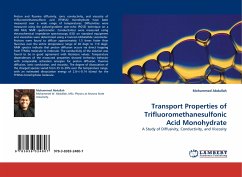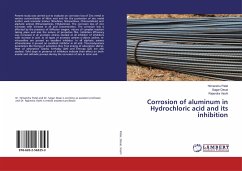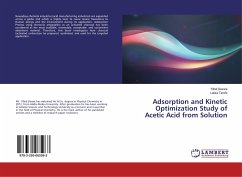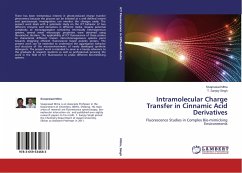
Transport Properties of Trifluoromethanesulfonic Acid Monohydrate
A Study of Diffusivity, Conductivity, and Viscosity
Versandkostenfrei!
Versandfertig in 6-10 Tagen
32,99 €
inkl. MwSt.

PAYBACK Punkte
16 °P sammeln!
Proton and fluorine diffusivity, ionic conductivity, and viscosity of trifluoromethanesulfonic acid (TFMSA) monohydrate have been measured over a wide range of temperatures. Diffusivities were measured using the pulsed-gradient spin-echo (PGSE) technique on a 300 MHz NMR spectrometer. Conductivities were measured using electrochemical impedance spectroscopy (EIS) on standard equipment and viscosities were determined using a Cannon-Ubbelohde viscometer. Protons were found to diffuse approximately 1.5 times faster than fluorines over the entire temperature range of 40 degC to 110 degC. NMR spect...
Proton and fluorine diffusivity, ionic conductivity, and viscosity of trifluoromethanesulfonic acid (TFMSA) monohydrate have been measured over a wide range of temperatures. Diffusivities were measured using the pulsed-gradient spin-echo (PGSE) technique on a 300 MHz NMR spectrometer. Conductivities were measured using electrochemical impedance spectroscopy (EIS) on standard equipment and viscosities were determined using a Cannon-Ubbelohde viscometer. Protons were found to diffuse approximately 1.5 times faster than fluorines over the entire temperature range of 40 degC to 110 degC. NMR spectra indicate that proton diffusion occurs via direct hopping from TFMSA molecule to molecule. The conductivity of the solution was found to be in good agreement with literature values. Temperature dependences of the measured properties showed Arrhenius behavior with comparable activation energies for proton diffusion, fluorine diffusion, ionic conduction, and viscosity. The degree of dissociation of the charged species varied from 25 to 29% over the temperature range, with an estimated dissociation energy of 2.8+/-0.14 kJ/mol for the TFMSA monohydrate molecule.












